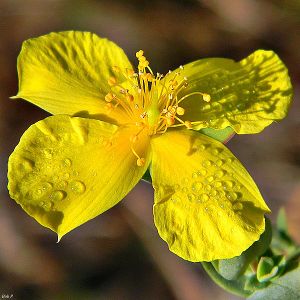Note: This is a project under development. The articles on this wiki are just being initiated and broadly incomplete. You can Help creating new pages.
Difference between revisions of "Hypericum perforatum - Klamath Weed"
| Line 2: | Line 2: | ||
'''Hypericum perforatum''' may be used to refer to any species of the genus Hypericum. it is used for the treatment for depression in humans. | '''Hypericum perforatum''' may be used to refer to any species of the genus Hypericum. it is used for the treatment for depression in humans. | ||
==Uses== | ==Uses== | ||
| − | {{Uses|Depression}}, {{Uses|Sciatica}}, {{Uses|Black cohosh }}, {{Uses|Menopause}}, {{Uses|Dermatitis}}, {{Uses|Anxiety}}, {{Uses|Pimples}}, {{Uses|Diarrhea}}, {{Uses|Sore throats}}. | + | {{Uses|Depression}}, {{Uses|Sciatica}}, {{Uses|Black cohosh}}, {{Uses|Menopause}}, {{Uses|Dermatitis}}, {{Uses|Anxiety}}, {{Uses|Pimples}}, {{Uses|Diarrhea}}, {{Uses|Sore throats}}. |
==Parts Used== | ==Parts Used== | ||
| Line 11: | Line 11: | ||
==Common names== | ==Common names== | ||
| − | {{Common names|kn=|ml=|sa=|ta=|te=|hi=|en=Klamath Weed}} | + | {{Common names|kn=|ml=|sa=|ta=Vettai pakku|te=|hi=Choli phulya|en=Klamath Weed}} < |
==Properties== | ==Properties== | ||
Latest revision as of 09:38, 3 November 2020
Hypericum perforatum may be used to refer to any species of the genus Hypericum. it is used for the treatment for depression in humans.
Contents
- 1 Uses
- 2 Parts Used
- 3 Chemical Composition
- 4 Common names
- 5 Properties
- 6 Habit
- 7 Identification
- 8 List of Ayurvedic medicine in which the herb is used
- 9 Where to get the saplings
- 10 Mode of Propagation
- 11 How to plant/cultivate
- 12 Commonly seen growing in areas
- 13 Photo Gallery
- 14 References
- 15 External Links
Uses
Depression, Sciatica, Black cohosh, Menopause, Dermatitis, Anxiety, Pimples, Diarrhea, Sore throats.
Parts Used
Chemical Composition
The major constituents of the essential oils were α-pinene (12.52–49.96%), β-pinene (6.34–9.70%), (E)-β-ocimene (4.44–12.54%), β-caryophyllene (1.19–5.67%), and germacrene-D (2.34–6.92%).[1]
Common names
| Language | Common name |
|---|---|
| Kannada | |
| Hindi | Choli phulya |
| Malayalam | |
| Tamil | Vettai pakku |
| Telugu | |
| Marathi | NA |
| Gujarathi | NA |
| Punjabi | NA |
| Kashmiri | NA |
| Sanskrit | |
| English | Klamath Weed |
<
Properties
Reference: Dravya - Substance, Rasa - Taste, Guna - Qualities, Veerya - Potency, Vipaka - Post-digesion effect, Karma - Pharmacological activity, Prabhava - Therepeutics.
Dravya
Rasa
Guna
Veerya
Vipaka
Karma
Prabhava
Habit
Identification
Leaf
| Kind | Shape | Feature |
|---|---|---|
| Simple | Leaves shape is lobed or unlobed but not separated into leaflets |
Flower
| Type | Size | Color and composition | Stamen | More information |
|---|---|---|---|---|
| Unisexual | 2-4cm long | Yellow | 13 | There are two or more ways to evenly divide the flower |
Fruit
| Type | Size | Mass | Appearance | Seeds | More information |
|---|---|---|---|---|---|
| General | 3–6.5 mm | Clearly grooved lengthwise, Lowest hooked hairs aligned towards crown | With hooked hairs | Many | {{{6}}} |
Other features
List of Ayurvedic medicine in which the herb is used
Where to get the saplings
Mode of Propagation
How to plant/cultivate
Easily grown in any reasonably good well-drained but moisture retentive soil[3]
Commonly seen growing in areas
Open woods, Hedgebanks, Grassland, Dry sunny places, Calcareous soils.
Photo Gallery
References
External Links
- Ayurvedic Herbs known to be helpful to treat Depression
- Ayurvedic Herbs known to be helpful to treat Sciatica
- Ayurvedic Herbs known to be helpful to treat Black cohosh
- Ayurvedic Herbs known to be helpful to treat Menopause
- Ayurvedic Herbs known to be helpful to treat Dermatitis
- Ayurvedic Herbs known to be helpful to treat Anxiety
- Ayurvedic Herbs known to be helpful to treat Pimples
- Ayurvedic Herbs known to be helpful to treat Diarrhea
- Ayurvedic Herbs known to be helpful to treat Sore throats
- Herbs with Dried folaige used in medicine
- Herbs with Whole herb used in medicine
- Herbs with common name in Hindi
- Herbs with common name in Tamil
- Herbs with common name in English
- Habit - Herb
- Index of Plants which can be propagated by Seeds
- Herbs that are commonly seen in the region of Open woods
- Herbs that are commonly seen in the region of Hedgebanks
- Herbs that are commonly seen in the region of Grassland
- Herbs that are commonly seen in the region of Dry sunny places
- Herbs that are commonly seen in the region of Calcareous soils
- Herbs
- Ayurvedic herbs that don't have seed photos
- Hypericaceae








